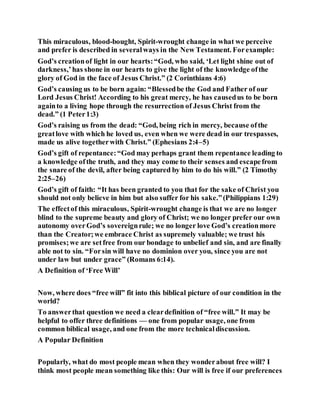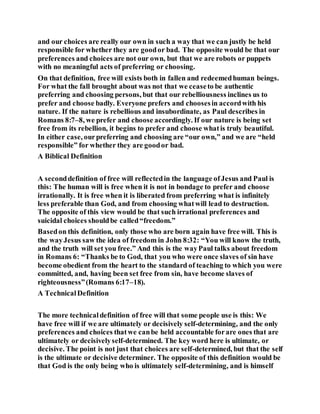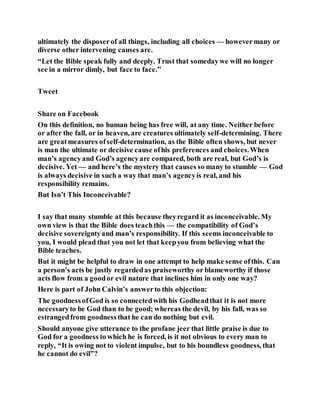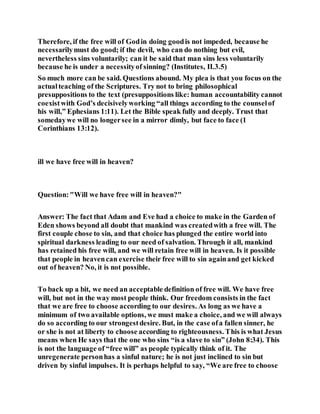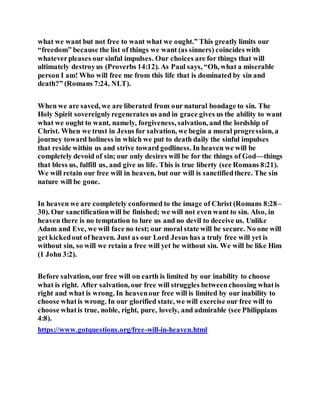1. Jesus healed a blind man in different ways than expected, showing that God's methods are diverse.
2. People should not dictate to God how or where he answers prayers, as he often works in unexpected ways.
3. Conversions can happen gradually rather than suddenly, and believers may not know the results of their prayers until heaven.
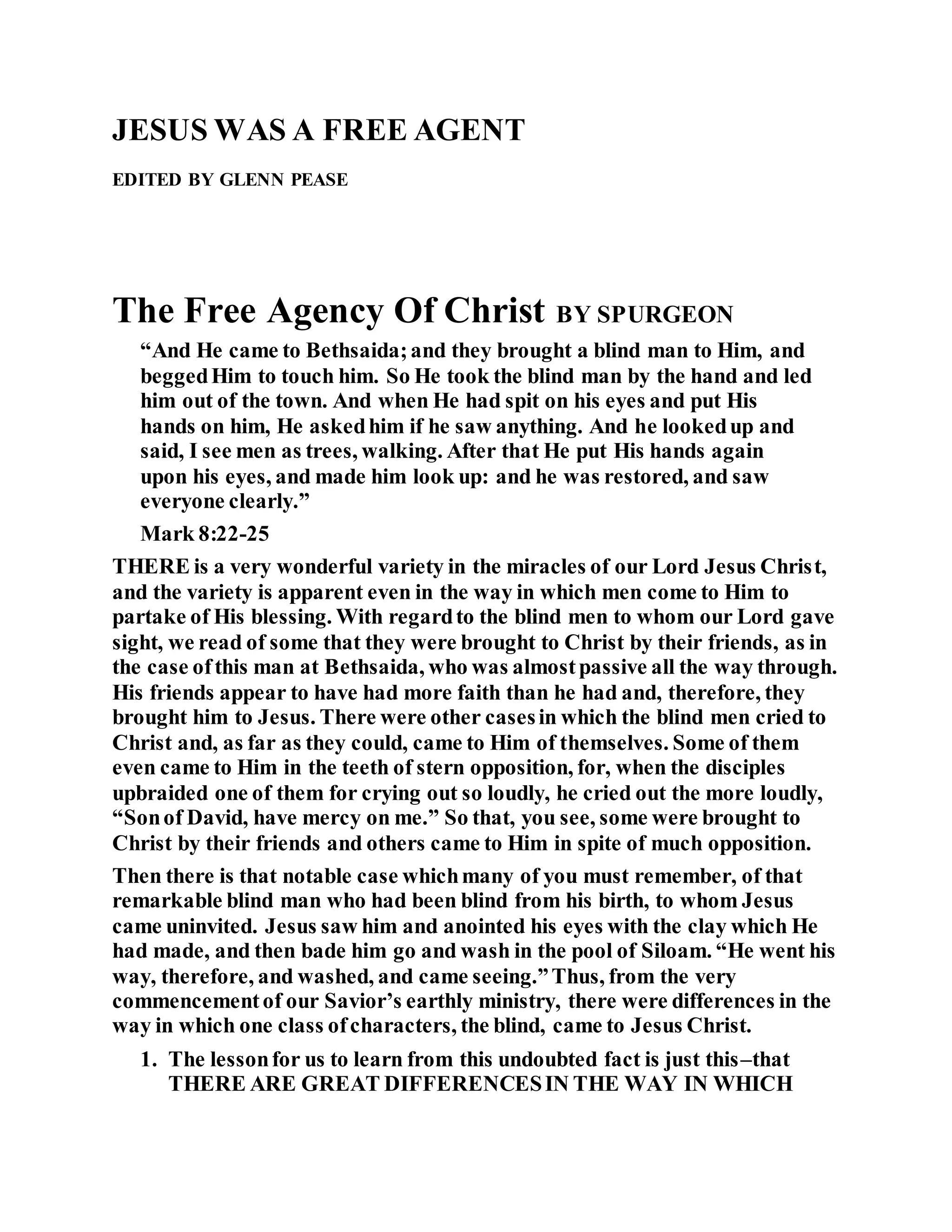
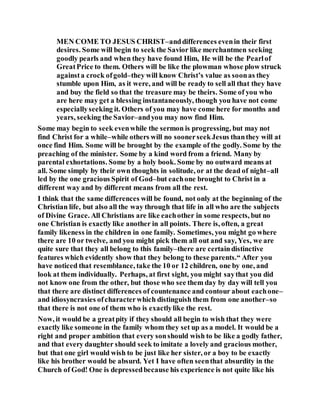
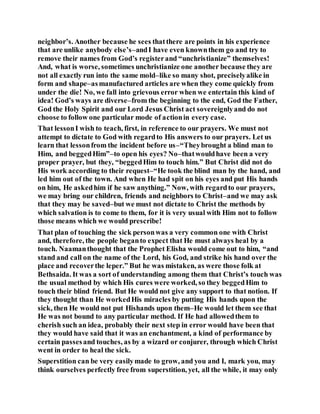
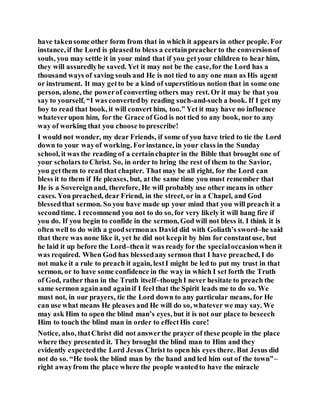
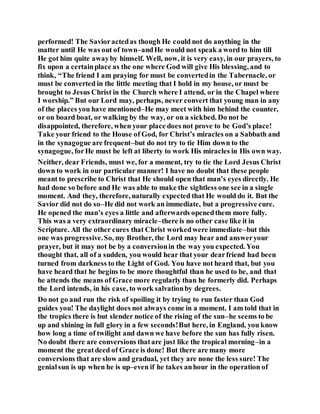
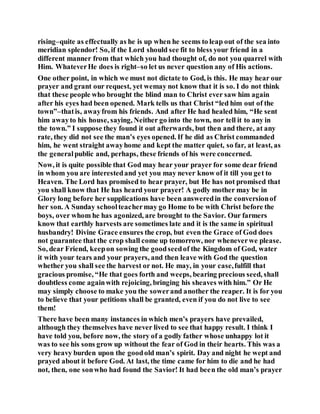
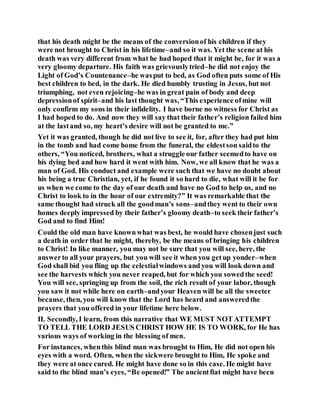
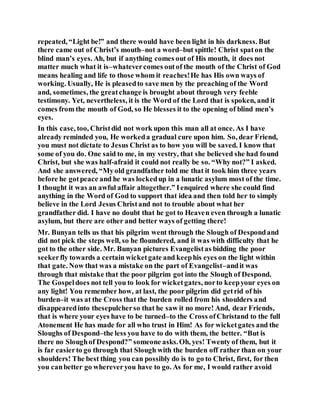
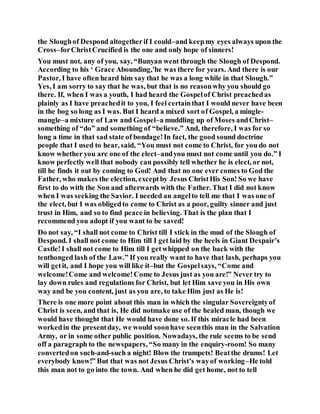
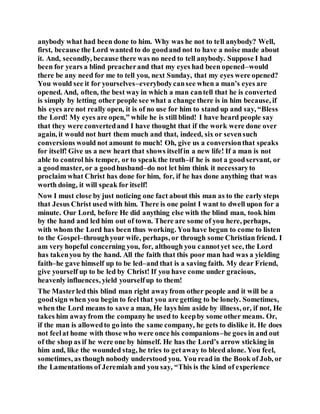
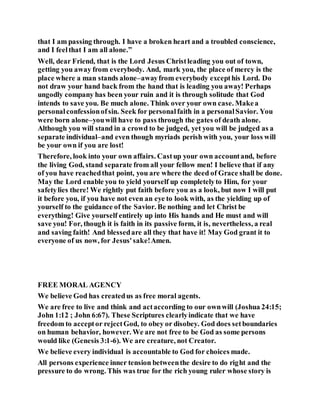
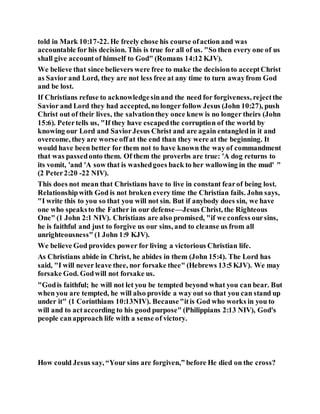
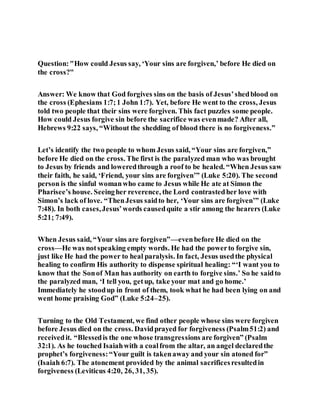
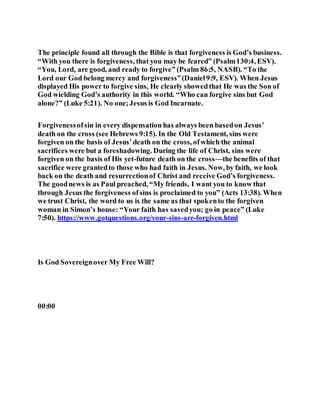
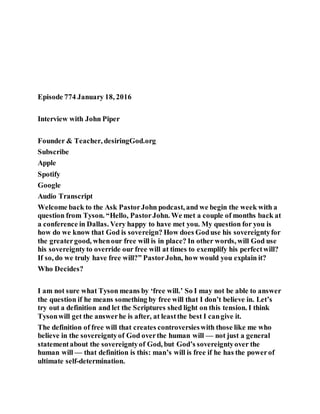
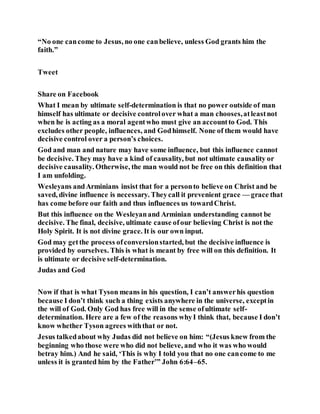
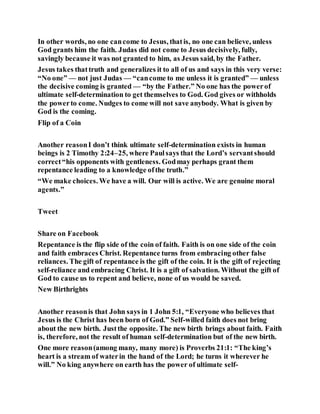
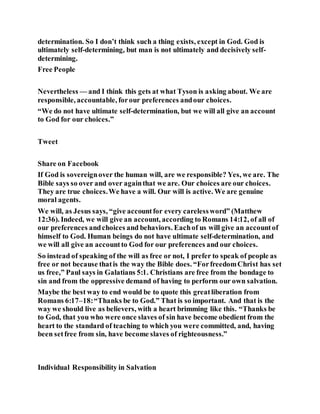
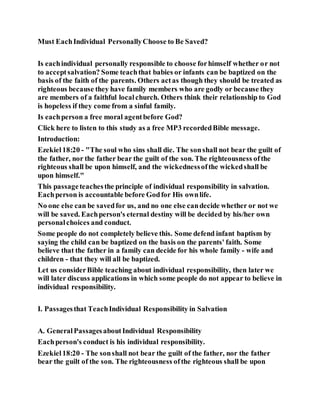
![himself, and the wickednessofthe wickedshall be upon himself. A father and
son are eachresponsible for his own wickednessorrighteousness. [1 John 3:4]
Matthew 7:21-28 - For everyone (individual), not just one who confessesJesus
will enter the kingdom, but he who does (individual) the will of the Father.
Whether or not a person's spiritual house stands or falls is determined by who
hears and does (or does not do) what Jesus teaches. This is true for "whoever"
(v24) or "everyone" (v26).
Matthew 16:24,25 - Anyone (an individual) who desires to come after Jesus
must deny himself (individual), take up his cross (individual), and follow
Jesus. Whoeverloses His life (individual) for Christ will find it. Jesus here
discusses the basic issue of whether or not one is His disciple. That choice is an
individual choice. Note:This applies to "anyone."
Acts 10:35 - In every nation whoever(individual) fears Him and works
righteousness is acceptedby Him. Note that the person who is acceptedis the
same person who fears God and works righteousness.This is true for
everyone (whoever) in every nation. V34 - No partiality; this is the same for
all.
James 1:23-25 - If anyone (individual) hears God's word and does not do it, he
is like a man (individual) who observes himself (individual) in a mirror but
then forgets what he saw. But he who (individual) looks into the perfect law of
liberty and continues doing the work, this one (individual) will be blessedin
what he does (individual). Note that the one who is blessedis the same one
who continued doing what he saw in the word.
This is individual responsibility.
[John 14:21-24;15:5,6;Matt. 12:30,50;24:13; Acts 2:21; 1 Tim. 2:9; Heb.
6:11; 1 John 2:4-6; 3:7,10;2 John 9]
Eachperson's eternal destiny is basedon individual responsibility.
2 Corinthians 5:10 - At judgment eachone (individual) will receive the things
done in the body, according to what he has done (individual), whether goodor
bad. The one being judged will be rewardedaccording to what he did, not
what someone else did. This applies to "all."
Romans 14:12 - Eachof us (individual) shall give accountof himself
(individual) to God. No one else - only you - will be judged for what you did.
Romans 2:6-10 - God will render to eachone (individual) according to his
deeds (individual - v6). Tribulation and anguish on every soul of man who
does evil (individual - v9), but glory, honor, and peace to everyone who works
what is good(individual - v10).](https://image.slidesharecdn.com/jesuswasafreeagent-200320173948/85/Jesus-was-a-free-agent-20-320.jpg)
![Galatians 6:7,8 - Whatevera man sows (individual) that he will also reap
(individual). He who sows to the flesh (individual) will reap corruption. He
who sows to the spirit (individual) will reap everlasting life. What you
personally reap will be determined by how you personallylived.
Note:"Do not be deceived. God is not mocked." When people think they can
avoid being punished or rewarded for how they lived, or when they think
people will reap according to how someone else lived, they are deceivedand
are attempting to mock God!
[Revelation20:13,15]
B. PassagesaboutIndividual Responsibility in the Steps to Salvation
Now considerhow this individual responsibility in salvationrequires each
individual to personally take eachof the steps that the gospelsays are
necessaryto salvation.
Hearing the gospel
John 6:44,45 - No one can come to Jesus unless drawn by the Father(by
teaching). Everyone who hears and learns from the Father comes to Jesus.
The one who comes is the one who must first hear and learn, and no one can
come unless they do it.
Mark 7:14 - Jesus commanded "everyone ofyou" to hear and understand His
teaching. Eachindividual must hear and understand.
Mark 16:15,16 - The gospelshould be preachedto every creature in the whole
world. "He who" (eachindividual) believes and is baptized will be saved. The
person who is savedis the same personwho must first hear, understand,
believe, and be baptized. This applies to "every creature" in the whole world.
No one can learn the gospelfor you, and you cannot learn it for anyone else.
We may teachothers and help them learn. But learning God's word is
individual responsibility.
[Luke 10:16; Acts 3:23]
Faith
Mark 16:15,16 - Again, the one who is savedmust first hear, believe, and be
baptized. But note also that he who (individual) does not believe will be
condemned. Whether one is savedor condemned is determined by individual
choices.
John 3:16,36 - Whoever (or "he who" - an individual) believes should have
everlasting life. But he who (individual) does not believe will receive wrath,
not life. The individual who seeks eternallife is the same one who must](https://image.slidesharecdn.com/jesuswasafreeagent-200320173948/85/Jesus-was-a-free-agent-21-320.jpg)
![believe. If he does not, he will have wrath. Again, this applies to everyone in
the whole world.
Acts 10:43 - Whoeverbelieves in Him will receive remissionof sins. The
individual who wants remissionis the same individual who must believe.
Romans 10:9-11 - With the heart one (an individual) believes to righteousness,
and with the mouth confessionis made to salvation. "Whoever" (individual)
believes on Him will not be put to shame. Eachindividual has his own heart in
which he must believe and eachindividual has his own mouth with which he
must confess Christ.
Hebrews 11:6 - He who (individual) comes to God must believe that He exists
and rewards those who seek Him. The one who wants to come is the one who
must believe. What if he does not believe? Then he cannot possibly please
God.
Faith is an individual responsibility. No one canbelieve for you, and you
cannot believe for anyone else.
[John 5:24; 11:25,26;Romans 1:16; 3;26]
Repentance
Acts 2:38 - "Everyone of you" (each individual) should repent and be
baptized for remissionof sins. But the same individual who seeksremissionis
the one who must repent. Both repentance and baptism are individual
responsibilities.
2 Peter3:9 - God is not willing for "any" (individual) to perish but wants all
to come to repentance. To avoid perishing, eachindividual must repent.
Repentance is an acknowledgementof guilt and a need to change ones life. No
one candecide for you to change your life, and you cannotdecide for others.
By nature it is inherently an individual responsibility.
Confession
Romans 10:9,10 - Again, the individual ("one")who seeks to be savedmust
first believe in his heart and confess Christwith his mouth. Just as each
individual has his own heart in which he must believe, so eachindividual has
his ownmouth with which he must confess Christ.
Matthew 10:32 - Whoever (an individual) confesses Jesus, Jesus willconfess
him (individual) before the Father. Note that the same individual who is
confessedbefore the Father is the same one who must confess Jesus before
men. [1 John 4:15]](https://image.slidesharecdn.com/jesuswasafreeagent-200320173948/85/Jesus-was-a-free-agent-22-320.jpg)

![Before the fall of Adam, man was sinless and able not to sin. For God “saw
everything that he had made, and behold, it was very good” (Genesis 1:31).
But he was also able to sin. For God had said, “In the day that you eat of it
[the tree] you shall surely die” (Genesis 2:17).
As soonas Adam fell into sin, human nature was profoundly altered. Now
man was not able not to sin. In the fall, human nature lostits freedom not to
sin.
Why is man not able not to sin? Because onthis side of the fall “that which is
born of the flesh is flesh” (John 3:6), and “the mind of the flesh is hostile to
God, for it does not submit to God’s law; indeed, it cannot, and those who are
in the flesh cannotplease God” (Romans 8:7–8, my translation). Or, as Paul
says in 1 Corinthians 2:14, “The natural persondoes not acceptthe things of
the Spirit of God, for they are folly to him, and he is not able to understand
them because they are spiritually discerned.”
Notice the word cannot twice in Romans 8:7–8, and the words “is not able” in
1 Corinthians 2:14. This is the nature of all human beings when we are born
— what Paul calls the “natural person,” and what Jesus calls “bornof the
flesh.”
Too Rebellious to Submit to God
This means, Paul says, that in this condition we “cannotplease God,” or, to
put it another way, “we are not able not to sin.” The basic reasonis that the
natural personprefers his own autonomy and his own glory above the
sovereigntyand glory of God. This is what Paul means when he says, “The
mind of the flesh is hostile to God, for it does not submit . . . ”
“Believing is not just affirming the truth of Jesus, but is also seeing the beauty
and worth of Jesus.”
Tweet
Share on Facebook
Glad submission to God’s authority, and to God’s superior value and beauty,
is something we are not able to do. This is not because we are kept from doing
what we prefer to do. It is because we preferour own authority, and treasure
our own value, above God’s. We cannotprefer Godas supremely valuable
while preferring ourselves supremely.](https://image.slidesharecdn.com/jesuswasafreeagent-200320173948/85/Jesus-was-a-free-agent-24-320.jpg)
![The reasonfor this idolatrous preference is that we are morally blind to the
glory of Christ, so that we cannot treasure his glory as superior to our own.
Satanis committed to confirming us in this blinding preference. “The godof
this world has blinded the minds of the unbelievers, to keepthem from seeing
the light of the gospelof the glory of Christ” (2 Corinthians 4:4). So when the
natural personlooks at the glory of God, whether in nature or in the gospel,
he does not see supreme beauty and worth.
To Believe We Must See Beauty
This is the basic reasonthat the natural personcannot believe in Christ.
Believing is not just affirming the truth of Jesus, but is also seeing the beauty
and worth of Jesus, in such a waythat we receive him as our supreme
treasure. The wayJesus expressedthis was to say, “Whoeverloves father or
mother more than me is not worthy of me, and whoeverloves son or daughter
more than me is not worthy of me” (Matthew 10:37). There is no saving
relationship with Jesus where faith does not consistin treasuring Jesus above
your dearestearthly treasures.
Where this wakening to the supreme glory and value of Jesus (called“new
birth”) has not happened, the fallen human heart cannot believe in Jesus.
That’s why Jesus said to those who opposedhim, “How canyou believe, when
you receive glory from one another and do not seek the glory that comes from
the only God?” (John 5:44). In other words, you cannotbelieve in Jesus while
you treasure human glory over his. Forbelieving is just the opposite.
Believing in Jesus means receiving him as supremely glorious and valuable
(John 1:12).
This is why the natural person cannot please God. Forhe cannotbelieve God
in this way. He cannot receive him and his Son as supremely valuable. But the
Bible says, “Without faith it is impossible to please him [God]” (Hebrews
11:6). Or, as Paul says, even more dramatically, in Romans 14:23, “Whatever
does not proceedfrom faith is sin.”
The GreatRenovationThrough Christ
The stark reality, therefore, is that human beings, as we are born — with an
ordinary, fallen human nature — are not able not to sin. We are, as Paul and
Jesus both affirm, “slaves ofsin” (John 8:34; Romans 6:20). The remedy for
this condition is the free and sovereigngrace ofGod bringing about a root
change in our fallen nature.](https://image.slidesharecdn.com/jesuswasafreeagent-200320173948/85/Jesus-was-a-free-agent-25-320.jpg)
